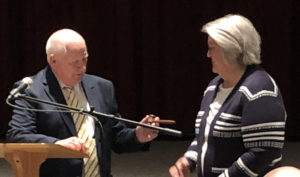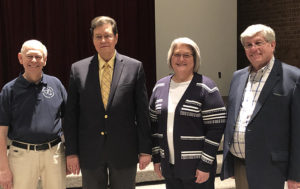By David Dawson
Baptist and Reflector
ddawson@tnbaptist.org

TBHS outgoing president Willie Beaty passes the gavel to newly-elected president Carolyn Gregory during the organization’s annual meeting.
NASHVILLE — This time, the Tennessee Baptist Historical Society made a little history of its own.
Carolyn Bridges Gregory was named as the TBHS’s first female president during the organization’s annual meeting on March 10 at the Southern Baptist Convention Building. It was the 23rd official gathering.
TBHS outgoing president Willie Beaty officially passed the baton — or, in this case, gavel — to Gregory during the business meeting portion of the annual event.
Beaty noted the timing of Gregory’s election was fitting, coming amid the centennial celebration of the passage of the 19th Amendment of the Constitution of the United States, giving women the right to vote.
The election of Gregory, who has been serving as the organization’s vice president, highlighted a full day’s agenda. Steve Holt, church services director for the Tennessee Baptist Mission Board, and Frank Lewis, pastor of Nashville First Baptist Church, served as keynote speakers, and TBMB collegiate ministries director Bill Choate also addressed attendees.
The annual meeting concluded with a ceremony honoring former Tennessee Baptist Mission Board executive director James Porch, who was presented with the Albert Wardin Meritorious Service Award. Porch spoke near the program’s end, and shared several humorous, first-person stories about famed preacher Hershel Hobbs.
Much of the program was focused on the central theme “Tennessee Baptists and the Great Depression.”

TBHS officers for the coming year will be, from left: Charles Parker, membership chairman; Richard Winstead, treasurer; Carolyn Gregory, president; Ronald K. Brown, journal editor. Also not pictured are Taffey Hall, secretary; Rick Bell, book review editor; and William McKee, vice president.
Holt, who spoke on the topic, noted that unemployment in the United States reached 25 percent during that dark period, and that the nation’s economy shrank by nearly 50 percent. Holt said the damage was so severe that it took nearly 25 years for the stock market to recover.
Baptist churches, however, were able to survive, Holt said, “thanks to many forward-thinking individuals” such as O.E. Bryan and John Freeman, former editors of the Baptist and Reflector who helped guide the SBC through the depression.
Holt said Baptists survived by putting their trust in Jesus. “Where God guides, He provides,” said Holt, adding that in many cases, God’s provision comes in the form of sending the right leaders at just the right moment.
Holt said churches were anchored by their faith, not material possessions, during those troubled times. Holt also said, while sounding a little bit like famous major leaguer Yogi Berra, that churches didn’t have to worry about their possessions being taken. “When you don’t have anything, they can’t take it away from you.”
During the afternoon session of the meeting, Lewis shared with attendees some history about Nashville FBC, which is celebrating its 200th anniversary this year. Lewis noted that he is just the 20th pastor in the church’s history, which demonstrates the longevity of those who fill that position. “We have a sweet fellowship,” he said, noting that some the FBC members were in attendance at the meeting.
Lewis, who is in his 23rd year as pastor at FBC, spoke about how the church stayed true to its principles during the Great Depression. He noted that documents from that time period reveal that the church gave 50 percent of every dollar to the Cooperative Program, which, at the time, was just beginning to take shape.
For more information on the Tennessee Baptist Historical Society, visit tnbapthis.wordpress.com.
